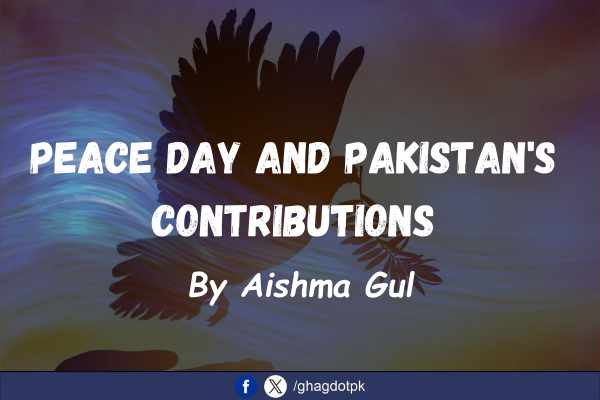By Aishma Gul
“Peace affects almost every aspect of our lives.” This insightful remark emphasizes the global truth that peace is necessary for the well-being of individuals, societies, and nations. The International Day of Peace, marked every year on September 21st, serves as a reminder of the world’s need for peace. The United Nations asks for a 24-hour ceasefire and encourages people to observe a minute of silence at noon to honor the victims of conflict and violence. This year’s theme, “Cultivating a Culture of Peace,” emphasizes that peace begins with individual and societal activities that promote harmony, not only the absence of hostilities.
The Path to Peace
The UN General Assembly established the International Day of Peace in 1981 to strengthen cross-border and community peace. For countries like Pakistan, where internal and foreign security challenges are common, peace is not just an abstract concept, but an ongoing quest. Pakistan’s military and security forces have played an important role in sustaining national peace while also contributing to international peacekeeping efforts.
The Military’s Contributions
According to the United Nations, Pakistan has provided over 235,000 personnel in 48 missions in 29 countries since 1960, making it one of the highest contributors to UN peacekeeping forces. Their contributions vary from conflict resolution to humanitarian aid, demonstrating Pakistan’s dedication to global peace.
Domestically, the military has spearheaded several operations to combat terrorism and insurgency, particularly in Khyber Pakhtunkhwa and Balochistan, where peace has been hard-earned through sacrifice and determination.
Pakistan’s Pursuit of Peace
Pakistan’s security forces, law enforcement agencies, and military have been tirelessly working to maintain national and international peace.
Peacekeeping Efforts
Pakistan’s security forces have:
– Over 3,539 terrorists were killed and 964 hideouts were destroyed (Operation Zarb-e-Azb, 2014-2017)
– Implemented the National Action Plan (2015) to counter terrorism and extremism
– Conducted Operation Radd-ul-Fasaad to counter-terrorism
Border Security Measures
– Over 900 km fence constructed along the Afghan-Pakistan border
– Thousands of troops deployed to secure borders
Internal Security Initiatives
Law enforcement agencies:
– Significant personnel deployed for internal security
– Over 5,000 police personnel trained in counter-terrorism.
Humanitarian Assistance
Pakistan’s security forces have:
– Assisted 1.5 million affected people during the 2010 floods
– Treated 1.3 million hectares during the 2019-2020 locust control operations
International Partnerships
Pakistan’s contributions:
– Approximately 235,000 troops in 48 missions across 29 countries since 1960
– Currently, around 3,000 Pakistani troops are deployed in UN peacekeeping missions, including countries like Congo, Central African Republic, Sudan, Somalia
Awards and Recognition
Pakistan’s security forces have received:
– UN Medal (2002) for peacekeeping services in Sierra Leone
– NATO Medal (2012) for contributions to ISAF mission in Afghanistan
Peace Beyond Conflict
Peace is more than just conflict resolution; it also includes environmental harmony, social and economic justice, mental health, and responsible technology use. Pakistan invested $62 billion in the China-Pakistan Economic Corridor (CPEC). Culturally, Pakistan preserves UNESCO World Heritage Sites like Mohenjo-Daro and Taxila. Environmentally, Pakistan intends to reduce carbon emissions by 30% by 2030. Pakistan has boosted education spending by 15% and immunized 90% of its children against polio. Furthermore, Pakistan promotes human rights and empowers women through a variety of activities. Internationally, Pakistan participates with regional organizations such as SAARC and ECO.
Several prominent projects in Pakistan have contributed to peace, including:
– Reforestation activities, which include planting over a billion trees to prevent climate change and enhance livelihoods, lowering resource-based tensions.
– Social initiatives intended at alleviating poverty, uplifting millions, and promoting economic stability and inequality reduction.
– Mental health awareness campaigns aimed at improving emotional well-being and encouraging societal peace.
– Technological innovations that provide digital access in remote locations while also fostering transparency and inclusivity are critical for long-term peace.
We are reminded that promoting peace is a shared duty on the International Day of Peace. The Pakistani military’s contribution to both domestic and international peace initiatives serves as a reminder that although maintaining world peace is important, daily acts are also the first step towards achieving peace. Individually, we may make a difference by settling disputes in our own lives, offering regrets when needed, and fostering kindness in our interactions. Ultimately, when multiplied by millions, small actions add up.






